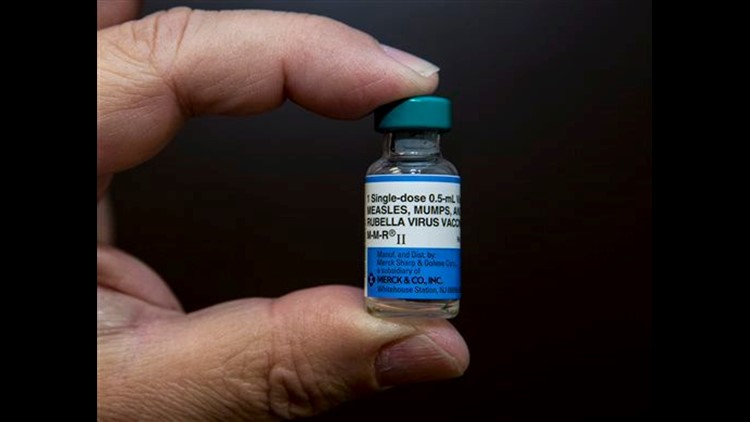NEW YORK (AP) — Measles has become relatively rare in the United States, thanks to very effective vaccine. A recent outbreak tied to Disneyland has shown that even among some doctors, knowledge of the once-common illness is spotty.
Some questions and answers about a still-dangerous disease that's re-emerged as a leading public health concern:
Q: How dangerous is measles?
A: For most people, measles is miserable but not life-threatening. The most common symptoms include fever, runny nose, cough, and a rash all over the body. However, a very small fraction of people get much sicker, and can suffer complications like pneumonia and encephalitis. Before there was a vaccine, about 450 to 500 Americans died from measles each year, on average. Also, measles can cause pregnant women to have premature, fragile babies.
Q: How is measles spread?
A: Measles is considered one of the most infectious diseases known. The virus is spread through the air when someone infected coughs or sneezes. It can live up to two hours in the air or on the surfaces of a room afterward. It's so contagious that 90 percent of people who aren't immunized are infected if exposed to the virus, according to the Centers for Disease Control and Prevention.
Q: How well does the vaccine work?
A: Health officials say the vaccine is 97 percent effective; people who are vaccinated can still get the measles, although it's usually a mild case. The vaccine was licensed in the United States in 1963, and as more children were vaccinated, cases plummeted. About a decade ago, the nation was down to fewer than 100 cases a year. In 2000, measles was declared eliminated — no longer constantly spreading in the country.
Q: Who should be vaccinated?
A: The government recommends that all children get measles vaccine with the first dose when they are about 1 and a second dose between the ages of 4 and 6. The CDC guidance is based on advice from a panel of experts that decides which vaccines are needed and when. Following that guidance, states have made vaccination a requirement for attending school.
Q: Are there any side effects?
A: Most people have no reaction. Some experience temporary pain or swelling where the needle went in. About 5 to 10 percent of those who get the measles-mumps-rubella vaccine experience a low-grade fever and a mild rash, according to the CDC.
Q: Do most parents get their kids vaccinated?
A: Yes, and the rates have been fairly stable. Overall, 95 percent of children entering kindergarten are vaccinated. But in a number of states, a rising number of parents have filed for exemptions to vaccination requirements. Some are for medical reasons, but many are for religious or philosophical reasons. Some of those involve doubts that the vaccine is necessary. Others fear that the vaccine can cause autism — a concern sparked by a study published in a British medical journal in 1998. That paper was later retracted and thoroughly discredited. Other studies have found no link. The new outbreak has spurred a backlash against vaccination holdouts.
Q: So if measles was eliminated in the U.S., why are we seeing cases now?
A: Measles is still a big problem in some other parts of the world, and travelers infected abroad can bring the virus into the country and spread it. That's what California health officials think happened at Disneyland amusement park, although they haven't found the person who triggered the outbreak. The last several years have seen more and more of that. Last year, 644 measles infections were reported in 27 states, the most since 1994. More than half of the cases were in an Amish community in Ohio; missionaries brought measles back from the Philippines.
Q: I'm an adult. Do I need a shot?
A: Most likely not. Anyone born before 1957 is thought to be immune because measles was so widespread, and most kids got it. Adults who got the vaccine as kids are OK, too — they are protected for life. However, there was a less-effective vaccine from 1963 to 1967. Anyone who got that vaccine or those who aren't sure they were ever vaccinated can get the shots now.
___
Online:
CDC measles info: http://www.cdc.gov/measles/about/faqs.html
Copyright 2015 The Associated Press. All rights reserved. This material may not be published, broadcast, rewritten or redistributed.



